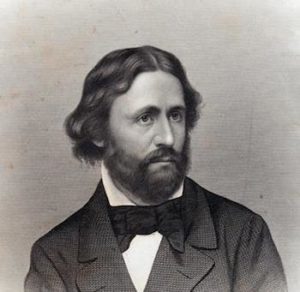
John Fremont
*John Fremont was born on this date in 1813. He was a white-American soldier, politician, and abolitionist.
From Savannah, Georgia, educated at Charleston College, John Charles Fremont taught mathematics before joining the Army Topographical Engineers Corps in 1838. Among other field services, in 1842, Fremont mapped most of the Oregon Trail and climbed the second-highest peak in the Wind River Mountains, afterward known as Fremont Peak. Fremont made many expeditions; in 1845, he explored the Great Basin and the Pacific coast.
When the Mexican War started, Fremont was ranked major in the United States Army and helped annex California. Commodore Robert Stockton appointed Fremont as governor of California. In 1850, Fremont was elected senator. A strong opponent of slavery, Fremont helped found the Republican Party and, in 1856, was chosen as its first presidential candidate. With the American Civil War outbreak, he was appointed as a Major General in the Union Army and commanded the newly created Western Department based in St. Louis.
On August 30, 1861, Fremont proclaimed that all slaves owned by Confederates in Missouri were free. President Abraham Lincoln was furious and asked him to modify his order; Fremont refused to claim that "it would imply that I thought it wrong and that I had acted without reflection, which the gravity of the point demanded." Lincoln was urged to dismiss him. He was replaced by Horace Greeley, editor of the New York Tribune, who wrote an open letter to Lincoln defending Fremont and criticizing the president for failing to make slavery the dominant issue of the war and compromising moral principles for political motives.
Lincoln famously replied: "My paramount object in this struggle is to save the Union, and is not either to save or destroy slavery. If I could save the Union without freeing any slave, I would do it, and if I could save it by freeing all the slaves, I would do it." Fremont spent the rest of the war in New York. In May 1864, a convention of Radical Republications selected Fremont as their presidential candidate. The idea of a radical candidate standing in the election worried Lincoln, and negotiations began to persuade him to change his mind.
His price was removing his old enemy, Montgomery Blair, from the Cabinet. On September 22, 1864, Fremont withdrew from the contest. The following day, Lincoln sacked Blair and replaced him with the radical William Dennison. After the War, Fremont became involved in and failed at railroad financing and building. He (then) became governor of Arizona Territory from 1873 to 1883. Fremont wrote several books about his expeditions and his autobiography, Memories of My Life 1887. John Fremont died in New York City on July 13, 1890.
The Encyclopedia Britannica, Fifteenth Edition.
Copyright 1996 Encyclopedia Britannica Inc.
ISBN 0-85229-633-0